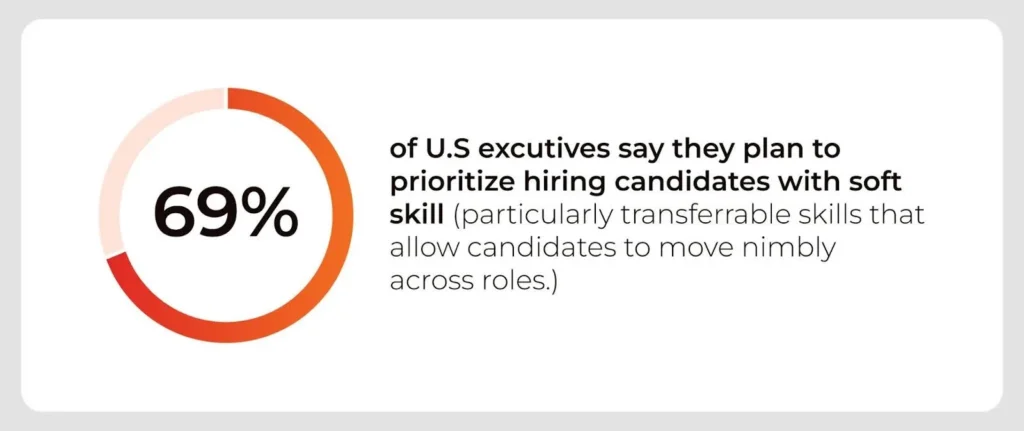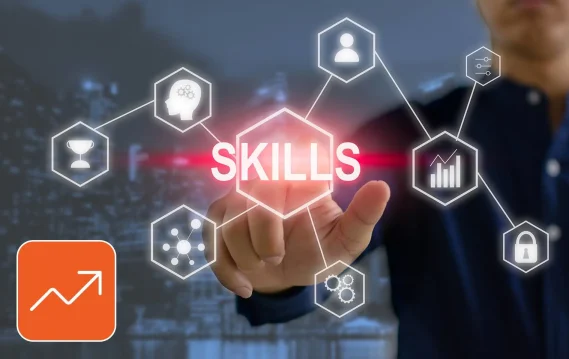The job market is evolving and getting increasingly competitive. Simply being good at your craft isn’t enough anymore. You could be a data wizard, a design expert, or fluent in four programming languages, but if you can’t collaborate, manage conflict, or communicate clearly under pressure, your growth will stall.
Modern career success demands more than just technical ability. It demands a balance. And that’s where the Hard Skills vs Soft Skills conversation becomes critical. It can work as a practical framework for becoming the kind of professional organizations prefer.
If you’re aiming for that next role, seeking to stand out in interviews, or positioning yourself for leadership, mastering both hard and soft skills is non-negotiable. Hard skills show you’re equipped to do the work. Soft skills show you’re ready to lead, adapt, and thrive as your role evolves.
This guide breaks down the real difference between hard and soft skills, why both matter more than ever, and how to master them in a way that moves your career forward.
What Exactly Are Hard Skills?
Hard skills are the concrete, teachable abilities that get you through the door. They’re measurable, often certified, and nearly always listed on job descriptions.
If you’re a software engineer, this may mean fluency in Python, JavaScript, React, or the like. If you’re in healthcare, it’s diagnostic procedures or patient record systems. In marketing, it’s SEO, analytics, and campaign design.
These are the skills that say, “I know how to do this job technically.”
They’re often gained through degrees, certifications, or on-the-job training. Unlike soft skills, you can easily prove them through a test, a portfolio, or a project you’ve delivered.
What Are Soft Skills?
Soft skills, on the other hand, shape how you do the job. They’re your ability to listen deeply, think critically, handle feedback without flinching, or lead with empathy during tense moments.
These aren’t tied to your keyboard or your KPIs. But they have just as much impact on your growth. A software developer who communicates clearly will always outperform one who doesn’t. A nurse who calms anxious families brings more value than one who merely administers treatment.
Soft skills examples don’t show up in code or spreadsheets. But they show up in every meeting, every deadline, and every conflict.
Hard Skills vs Soft Skills: What’s the Real Difference?
At first glance, the difference between hard and soft skills seems obvious: one is technical, the other emotional.
But let’s go deeper.
Hard skills get your foot in the door. They’re the baseline. Without them, you may not even qualify for an interview. Soft skills, however, influence whether you’re remembered, respected, and retained.
Think of them like this: hard skills build your credibility; soft skills build your influence.
Both are essential, but they operate in different dimensions. A data analyst who can visualize insights clearly will do well. One who can also communicate those insights in a compelling way? They’ll become indispensable.
Why Soft Skills Matter More Than Ever
In an age of automation, the human edge remains irreplaceable. Machines can process data, but they can’t lead a brainstorming session, resolve conflict during a product sprint, or inspire trust in a high-stakes negotiation.
That’s why the importance of soft skills in the workplace has skyrocketed. As AI streamlines technical tasks, empathy, adaptability, and clear communication have become critical differentiators. Harvard Business Review highlights that even in remote settings (where spontaneous interactions are rare), professionals can develop soft skills by building trust through one-on-one conversations, showing genuine interest in colleagues, and intentionally practicing active listening and feedback.
What’s changing is how soft skills are treated: they’re no longer “bonus traits” but deal-breakers.
Why Hard Skills Still Hold Power
Let’s not swing the pendulum too far, though.
Hard skills are still the gatekeepers, especially in high-stakes sectors like IT, finance, law, or healthcare. You can’t coach your way through a neurosurgery or soft-talk a line of backend code into functioning.
Hiring managers still lean heavily on hard skills for resume shortlisting. If you don’t meet the technical baseline, no amount of charm will get you the job.
So yes, soft skills help you grow. But hard skills are still how you get in.
Can You Train Soft Skills?
Absolutely, and you should. Soft skills aren’t some magical trait you’re born with. They’re shaped by intent, reflection, and feedback.
Start with one-on-one conversations. Observe how leaders in your workplace navigate tension or motivate others. Notice how they listen more than they speak.
Online tools and clubs can improve public speaking. Asking colleagues for feedback on your communication style can surface blind spots. Even journaling after tough conversations can strengthen self-awareness, which is among the basic building blocks of emotional intelligence.
Learning how to improve soft skills is about noticing what works, internalizing it, and making it yours.
Choosing the Right Hard Skills to Master
Here’s where strategy kicks in.
Don’t just chase what’s trending. Focus on what aligns with your industry and where your role is headed.
For example, if you’re in HR, learning Excel formulas might help, but mastering talent analytics or AI-powered hiring platforms? That’s future-proofing. In healthcare, knowing patient information systems may soon matter as much as bedside etiquette.
A smart starting point is to audit job descriptions for roles you want 12–18 months from now. Which skills keep showing up? That’s your roadmap.
Online learning platforms can help. Many companies also offer structured skilling programs aligned with emerging job needs.
How to Showcase Both on Your Resume
Listing hard skills is easy. “Proficient in SQL, Tableau, Salesforce”. That is clear, scannable, objective.
But soft skills for resume? That’s where people get lazy and tend to use vague terms like “team player” or “great communicator.”
The fix? Let your achievements demonstrate soft skills. Don’t say you’re a problem solver. Show how you turned a failing campaign around with limited resources and three conflicting stakeholders.
Structure matters here too. Hard skills belong in a “Technical Skills” or “Certifications” section. Soft skills live in your accomplishments, project summaries, and leadership stories.
How Employers Actually Test for These
Hard skills are tested directly through coding assignments, technical interviews, case studies, and certifications.
Soft skills? They’re spotted between the lines.

How do you explain failure? How do you describe team dynamics? Do you speak with clarity or defensiveness? Do you overuse “I” or show collaborative instincts?
Hiring panels observe these cues, and sometimes, one moment of self-awareness can tip the scales in your favor more than an extra certification.
Why You Need Both and How to Balance Them
You can’t succeed with just one.
Too many professionals over-index on hard skills, thinking technical depth will carry them through. But without communication, emotional regulation, or leadership vision, they hit ceilings fast.
Equally, those with only soft skills struggle to stay relevant as industries evolve. A persuasive marketing head still needs to read metrics. A visionary founder still needs to understand product roadmaps.
True career growth, whether you’re in startups, corporates, or consulting, lies in combining both worlds. That’s what makes professionals adaptable, promotable, and ultimately, irreplaceable.
Balance and Build the Skillset That Moves You Forward
The most successful professionals don’t toggle between being “technical” or “empathetic.” They’re both. A senior product manager, for example, needs to translate customer insights (soft skill) into backlog priorities (hard skill) while influencing engineering timelines (both).
Mastery means knowing which skill to use and when.
So, what’s next for you?
Start with a hard skill you’ve been putting off: a new platform, a reporting tool, an industry cert. Pair it with a soft skill goal like better feedback delivery, cross-team influence, or public speaking.
Those two upgrades together could unlock your next role.
Your next big opportunity big opportunity may be right in front of you. SPECTRAFORCE connects professionals like you with roles that value both hard and soft skills. Find a place that allows your full potential to thrive.
FAQs
The most effective way to master both hard and soft skills is to treat them as equally essential parts of your long-term development, not competing priorities. Think of them as two sides of the same coin: technical ability gets you into the room, but interpersonal strength helps you lead once you’re there. Create a quarterly development plan that rotates between technical goals (like learning a new tool or certification) and soft skill goals (like improving your feedback delivery or conflict resolution style). This integrated approach keeps your growth well-rounded and future-ready.
To figure out which hard skills will boost your career growth, start by looking at roles one or two levels above your current position. Scan job descriptions, LinkedIn profiles of people in those roles, and industry-specific learning paths. What tools, certifications, or technical proficiencies show up repeatedly? That’s your signal. For example, if you’re in marketing and you consistently see CRM mastery or campaign analytics tools listed, those are worth prioritizing. Don’t just guess, but let the market guide your next learning investment.
Soft skills aren’t developed overnight, but built through small, intentional habits practiced consistently. If you’re looking to strengthen yours, the best place to start is with your everyday interactions. Here are the practical steps you can take daily to improve your soft skills
1. Practice active listening. Give people your full attention when they speak, resist the urge to interrupt or mentally prepare your response while they’re still talking.
2. Write with empathy. Whether it’s a quick message or a long email, focus on clarity, tone, and how your words might land, especially in sensitive situations.
3. Observe team dynamics. Watch how experienced colleagues manage conflict or motivate others in meetings. Take notes on what works.
4. Seek feedback. After important conversations or presentations, ask trusted peers or mentors how you came across and what you could improve.
5. Reflect intentionally. At the end of the day, think about moments that challenged you interpersonally, and what you might do differently next time.
These micro-practices may seem small, but over time, they compound into stronger emotional intelligence, better communication, and greater leadership presence.
To demonstrate both hard and soft skills in an interview, you need to move beyond listing traits and tell stories. Use the STAR method (Situation, Task, Action, Result) to explain how you used a hard skill in a real scenario and layered it with soft skills to drive impact. For instance, instead of saying “I’m good with CRM systems,” describe how you leveraged Salesforce to identify a client issue and then communicated a resolution across three teams under tight deadlines. This shows both your technical competency and your interpersonal effectiveness in one narrative.
Continuous learning is important for developing technical and interpersonal abilities because today’s workplace doesn’t stand still, and neither can you. Hard skills like programming languages or tools evolve quickly. What’s cutting-edge today may be outdated next year. At the same time, leadership styles, team structures, and communication norms shift with every generation and organizational change. Continuous learning keeps you aligned with both, allowing you to adapt your technical toolbox while also sharpening the soft skills that help you lead through change. It’s all about staying relevant and valuable.



